Why Your Business Needs AI Chatbot Solutions in 2025
In recent years, Malaysia has emerged as a hub for technological innovation, with artificial intelligence (AI) playing a pivotal role in transforming businesses, aligning with the nation’s Vision 2030 goals to become a technologically advanced and sustainable economy.
Among the most impactful AI technologies are AI chatbots, which are revolutionizing how companies interact with customers, streamline operations, and drive growth.
Adopting AI chatbot solutions has become necessary for SMEs and enterprises in Malaysia to stay competitive in today’s fast-paced digital economy.
Let us guide you as we delve into the landscape of AI chatbot solutions in Malaysia, examining their diverse applications and its emerging trends for your business to succeed.
The Current State of AI Chatbot Solutions in Malaysia
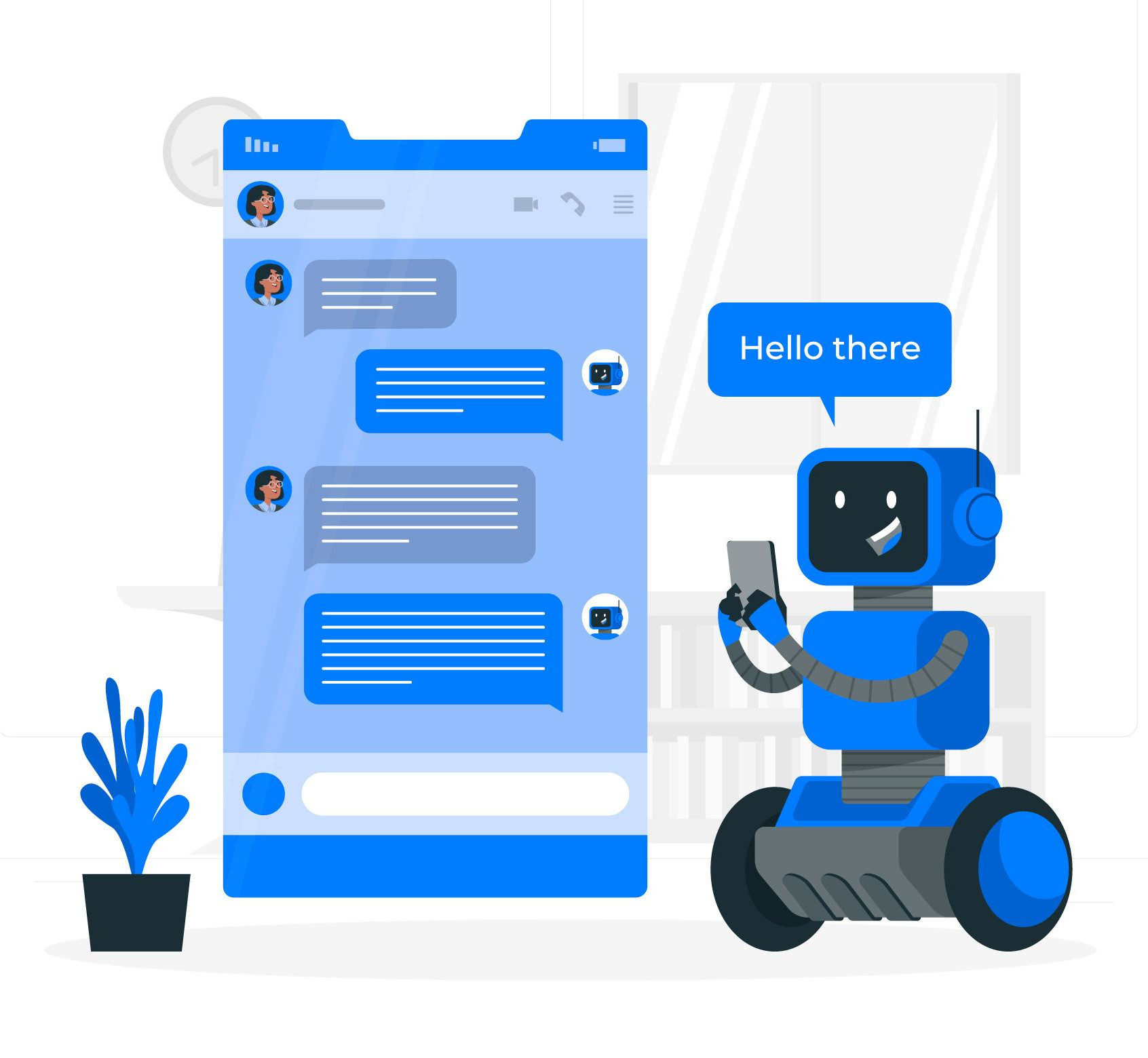
Credit: Freepik
2023 was an exciting year for AI in Malaysia, marked by the government’s proactive efforts to integrate AI into public services and drive innovation.
Since then, awareness of AI among Malaysians has steadily increased, reaching an impressive 84% among respondents by early 2024. This growth reflects the broader global trend of rising AI adoption and investment.
In particular, AI chatbots have gained traction in businesses for their ability to provide instant, personalised, and cost-effective customer support, allowing human agents to complete more complex tasks at hand.
Industries such as e-commerce, healthcare, banking, and logistics are leading the charge in adopting AI chatbots.
For instance, e-commerce platforms like Lazada use chatbots to handle customer inquiries, process orders, and provide product recommendations, while healthcare providers leverage them for appointment scheduling and patient support.
AI has also seamlessly integrated into the lives of Malaysian shoppers, with 37% of Malaysians finding AI chatbots particularly helpful for tasks like checking product availability, delivery status, and membership details.
The Malaysian government has shown strong support for AI by introducing initiatives like the National AI Framework in 2021 to drive adoption and innovation, further reinforced by the establishment of the National AI Office (NAIO) on 28 August 2024, which serves as the central authority to position Malaysia as a regional AI hub and accelerate its integration across industries.
Staying ahead of the curve in AI is crucial – check out Malaysia’s AI Landscape & What It Means For Businesses (2025).
Applications of AI Chatbots in Malaysian Businesses
AI chatbots are versatile tools with applications across various business functions, reflecting how AI is transforming how we live and work in Malaysia.
At the Malaysia Digital Tech Adoption Summit, it was highlighted that by 2030, AI is projected to contribute approximately US$115 billion to Malaysia’s productive capacity, showcasing its immense potential across key sectors such as manufacturing, healthcare, finance, and public services.
Here are some key applications that will benefit your business:
1. Enhancing Customer Support
AI chatbots deliver round-the-clock customer service, handling FAQs, resolving issues, and guiding users through processes seamlessly.
These automated tasks help reduce the workload on human agents and ensure reliable, consistent support, even outside business hours.
2. Boosting Sales and Marketing
Chatbots can help you engage potential customers, qualify leads, and even upsell products based on users’ preferences by offering personalised product recommendations like Shopify. They also enable personalised marketing campaigns by analysing customer data.
3. Operational Efficiency
From HR onboarding to inventory management, chatbots streamline internal processes across various functions, saving valuable time and resources and allowing teams to focus on higher-priority activities.
For example, AI chatbots can automate employee queries about leave balances and company policies, ensuring a smoother, more efficient workflow across your organisation.
4. E-commerce and Retail
Chatbots are also revolutionising the online shopping experience by providing personalised product recommendations, seamless payment processing, and real-time order tracking.
Platforms like have been leveraging chatbots to assist customers throughout their purchasing journey, from browsing to checkout:
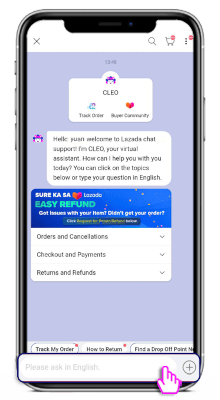
Lazada AI Chatbot (Cleo)
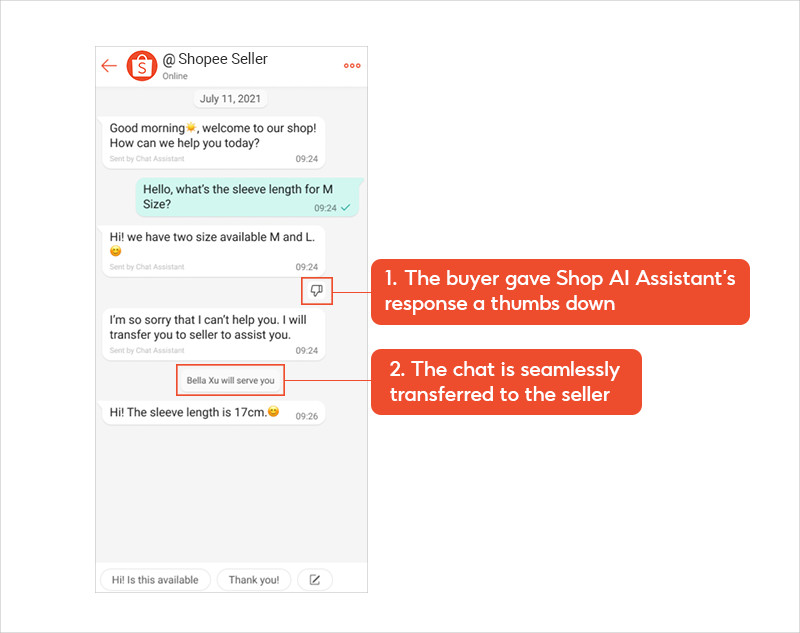
Shopee AI Chatbot
Post-purchase, these chatbots efficiently manage support tasks such as returns, refunds, and delivery updates, ensuring a smooth and satisfying customer experience.
Trends Shaping the Future of AI Chatbots in Malaysia

Credit: Freepik
Malaysia is driving digital transformation across its economy and is set to gain even greater momentum as it prepares to assume the ASEAN Chairmanship in 2025. In this role, Malaysia will lead ASEAN’s collective growth vision and solidify its position as a regional technology hub.
The Malaysia Digital Economy Corporation (MDEC) supports this ambition by projecting that AI adoption will contribute USD 13.4 billion to Malaysia’s GDP by 2030. This projection highlights the critical role of AI in advancing the nation’s Vision 2030 goals and emphasises its importance in shaping a digitally empowered future for both Malaysia and the broader ASEAN region.
As Malaysia’s AI chatbot landscape continues to evolve at a rapid pace, several key trends are shaping its future and driving innovation across industries. Here’s what to watch:
1. Hyper-Personalisation
Chatbots are becoming smarter by leveraging data analytics and enabling machine learning to deliver highly personalised interactions.
Malaysia’s E-commerce platforms use chatbots to recommend products based on browsing history, purchase behavior, and even real-time interactions. This level of personalisation enhances customer satisfaction and drives sales.
2. Multilingual Support
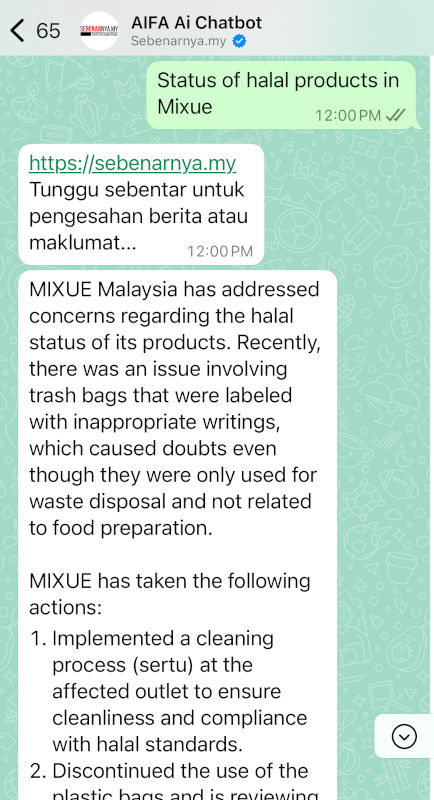
AIFA answering in English.
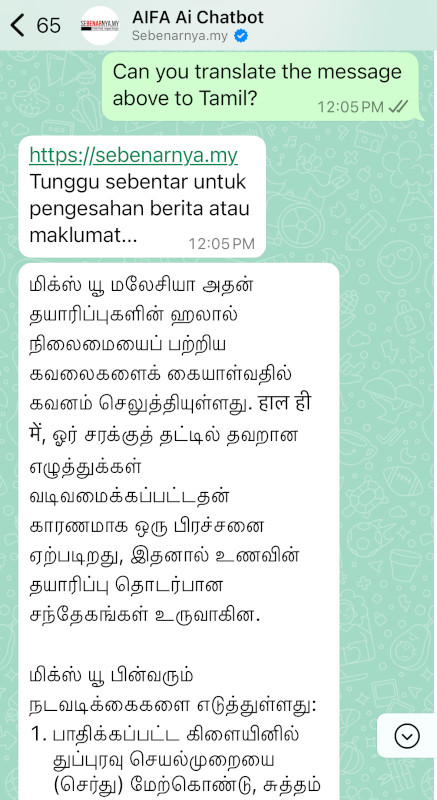
AIFA translating to Tamil.
To cater to Malaysia’s multicultural population, chatbots such as AIFA are now being designed to support multiple languages, including Bahasa Malaysia, English, Chinese, and Tamil.
This future of customer service will allow businesses to expand their customer base locally and globally.
Try it out at sebenarnya.my or on Whatsapp at +603 8688 7997.
3. Integration with IoT and Big Data
Chatbots are also increasingly integrated with IoT devices and big data platforms to provide smarter, data-driven insights.
As Malaysia becomes a smart nation, integrating chatbots with IoT and big data is crucial for delivering seamless, data-driven experiences.
In smart homes, chatbots can control IoT-enabled devices like lights, air conditioners, and security systems based on user preferences. Chatbots integrated with wearable devices in healthcare can provide personalised health advice by analysing real-time data.
Beyond residential applications, chatbots are proving invaluable in business settings. For example, in retail, they can provide personalised product recommendations and manage inventory by integrating with point-of-sale and warehouse management systems.
While in customer service, they automate responses to common queries, freeing up human agents for more complex issues.
Furthermore, in healthcare, when integrated with wearable devices, chatbots analyse real-time patient data to offer personalised health advice, extending this functionality to workplace wellness programs by monitoring employee health metrics and suggesting preventative measures.
4. Voice-Activated Chatbots
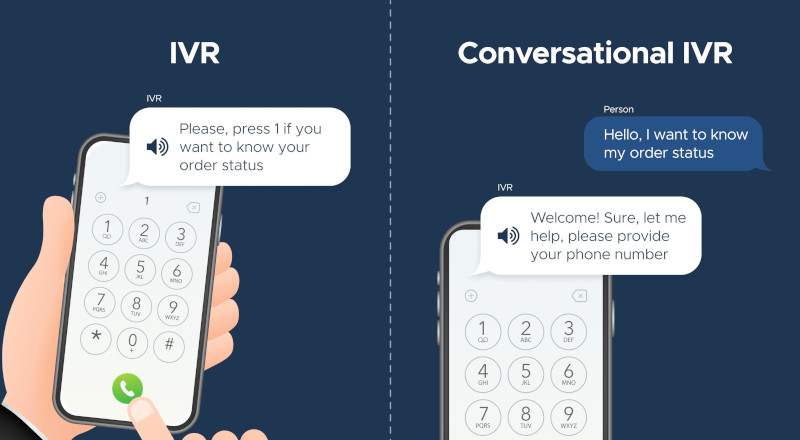
Credits: BotsCrew
With the rise of voice assistants like Google Assistant and Alexa, voice-activated chatbots are gaining popularity and offer significant benefits for people with disabilities by enabling hands-free, voice-controlled interactions with devices and services.
For individuals with mobility, visual, or cognitive impairments, these chatbots provide an accessible way to perform tasks, access information, and control smart devices without relying on traditional input methods.
As more Malaysians adopt smart devices, this technology will grow, fostering greater independence and inclusivity for people with disabilities in their daily lives.
5. AI Ethics and Data Security
As AI adoption grows, concerns about data privacy and ethical AI usage are becoming more prominent, especially regarding how personal data is collected, stored, and utilised.
The implementation of Malaysia’s Personal Data Protection Act (PDPA) requires businesses to ensure the privacy and security of user data. Ethical AI practices also play a critical role in building trust among users.
This includes implementing robust data protection measures, ensuring algorithmic fairness, and being transparent about how AI systems make decisions to address ethical concerns and safeguard user privacy.
Why SMEs in Malaysia Should Adopt AI Chatbot Solutions

Credit: Freepik
In today’s fast-paced digital economy, small and medium-sized enterprises (SMEs) in Malaysia are increasingly recognising the importance of adopting innovative technologies to stay competitive.
Among these technologies, AI-powered chatbots stand out as a game-changer, offering a wide range of benefits that can transform how SMEs operate and engage with their customers. Here’s why Malaysian SMEs should consider integrating AI chatbot solutions into their business strategies:
1. Cost Effectiveness
For SMEs, the strategic adoption of AI chatbots presents a powerful avenue for optimising operations and driving growth.
Central to this is the substantial reduction in operational costs. Industry analysts, like Gartner, confirm the significant financial impact of AI-driven customer service automation.
Their research, including the ‘Hype Cycle for Artificial Intelligence,’ highlights that businesses can achieve up to a 30% reduction in customer service costs through the implementation of chatbots and conversational AI.
This cost-effectiveness stems from AI’s proficiency in automating repetitive tasks, such as answering frequently asked questions, processing orders, and resolving common issues.
By handling up to 70% of customer inquiries, AI chatbots free human agents to focus on complex, high-value interactions that demand empathy and nuanced problem-solving.
Such synergy allows SMEs to strategically reallocate their human capital, investing in critical areas like product development and innovation while simultaneously enhancing customer satisfaction.
Human agents can then concentrate on building deeper customer relationships, addressing complex issues, and providing personalised guidance, ensuring a premium customer experience that maximises both AI efficiency and human value.
Ultimately, AI chatbots empower SMEs to achieve operational efficiency, cost savings, and enhanced customer experiences, driving sustainable growth.
2. Scalability
As businesses grow, so do their customer service demands. Hiring and training additional staff to handle increased inquiries can be time-consuming and costly.
AI chatbots offer a scalable solution, capable of handling a large volume of customer interactions simultaneously without the need for additional human resources. Whether it’s during peak seasons or as the business expands, chatbots ensure that customer service remains consistent and responsive, helping SMEs manage growth more efficiently.
3. Competitive Advantage
In a crowded and competitive market, standing out is crucial for SMEs. AI chatbots provide a unique opportunity to differentiate businesses by delivering faster, more personalised, and more efficient customer experiences.
For example, chatbots can offer instant responses, 24/7 availability, and tailored recommendations based on customer data.
This level of service enhances customer satisfaction and builds brand loyalty, giving SMEs an edge over competitors relying solely on traditional customer support methods.
4. Improved Customer Insights
AI chatbots are also powerful data-gathering platforms, aside from being dependable tools for communication. With their highly analytic behaviour in customer interactions, chatbots can provide valuable insights into customer preferences, pain points, and behavior patterns.
This data can be used to refine marketing strategies, improve products or services, and create more targeted campaigns. For SMEs in Malaysia, where understanding local market dynamics is key, these insights can be invaluable for driving business growth.
5. Enhanced Customer Experience
In an era where customers expect instant gratification, AI chatbots can meet these demands by providing quick and accurate responses to inquiries.
They can also offer personalised interactions, such as recommending products based on past purchases or addressing customers by name. This level of engagement fosters long-term relationships, which are critical for the sustained success of SMEs.
6. Adaptability to Local Markets
Malaysia’s diverse and multilingual population presents unique challenges for customer service. AI chatbots can be programmed to support multiple languages and dialects, ensuring that businesses can effectively communicate with customers across different regions and demographics.
This adaptability makes chatbots an ideal solution for SMEs looking to cater to Malaysia’s multicultural market.
7. Future-Proofing the Business
As AI technology continues to evolve, businesses that adopt it early will be better positioned to adapt to future trends and innovations.
SMEs in Malaysia can future-proof their operations, ensuring they remain agile and competitive in an increasingly digital world if they integrate AI Chatbots now.
Supercharge Your Business with AI Chatbot Solutions Today!
The future of AI chatbots in Malaysia is bright, driven by advancements in technology and the need to cater to a diverse and tech-savvy population.
As businesses and government agencies continue to adopt these technologies, AI chatbots will play an increasingly important role in enhancing customer experiences and driving digital transformation in Malaysia.
Why wait to unlock your business’s full potential?
If you’re exploring AI adoption for your business but require financial support, we’ve got you covered! As an experienced AI chatbot developer and software house, the VeecoTech team has been trusted by MNCs like Intel and government-linked organisations such as MCMC, MBPP and more.
VeecoTech also offers financing solutions tailored for SMEs, including grants like the NCER Grant, which can be particularly beneficial for businesses focused on software development.
If you’re looking to expand your AI capabilities, such as building advanced chatbots, these grants can provide crucial funding for your business.
Don’t wait—take the first step toward transforming your business with AI-powered solutions today with these 18 Latest SME Grants for Malaysia’s Businesses (2025)!
Your future starts now – let’s build it together with AI!
Frequently Asked Questions
1. What industries can benefit from AI chatbots in Malaysia?
AI chatbots have the potential to transform various industries in Malaysia by enhancing customer service, streamlining operations, and improving efficiency. AI chatbots can significantly benefit industries such as e-commerce, healthcare, banking, logistics, and retail.
Here’s a detailed look at how specific industries can benefit:
| Industries | Benefits of AI Chatbots |
| E-commerce |
|
| Healthcare |
|
| Banking |
|
| Logistics |
|
| Retail |
|
| Travel & Hospitality |
|
| Government Services |
|
2. How much does implementing an AI chatbot for an SME in Malaysia cost?
The cost of implementing an AI chatbot for an SME in Malaysia can vary significantly depending on the complexity, features, and platform used. Here are some factors influencing the cost:
- Type of Chatbot
- Rule-based chatbots: Simpler and cheaper, costing between RM 5,000 to RM 20,000.
- AI-powered chatbots: More advanced, with costs ranging from RM 20,000 to RM 100,000+, depending on the level of customisation and integration.
- Development Platform
Using pre-built platforms like Dialogflow, Microsoft Bot Framework, or ChatGPT APIs can reduce costs compared to building a chatbot from scratch. - Features
Basic chatbots with FAQ support are cheaper, while advanced chatbots with features like payment integration, multilingual support, or CRM integration will cost more. - Vendor vs. In-House Development
Hiring a local Malaysian vendor or agency might cost RM 20,000 to RM 50,000 for a mid-range chatbot. In-house development could save costs but requires skilled developers.
Estimated Cost Range for SMEs in Malaysia:
- Basic Chatbot: RM 5,000 – RM 20,000
- Advanced AI Chatbot: RM 20,000 – RM 100,000+
- Ongoing Maintenance: RM 1,000 – RM 5,000/month
3. Can AI chatbots support multiple languages for the Malaysian market?
Yes, AI chatbots can support multiple languages, which is particularly important in Malaysia’s multilingual and multicultural context. Some of the supported languages include Bahasa Malaysia, English, Chinese (Mandarin), Tamil, and other dialects depending on the audience.
For instance, Maybank’s chatbot supports multiple languages to cater to its diverse customer base, while in e-commerce, platforms like Lazada and Shopee use multilingual chatbots to assist customers in their preferred language.






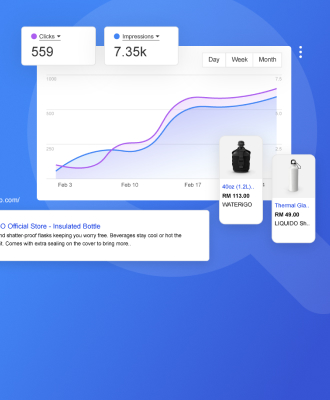





Leave A Comment